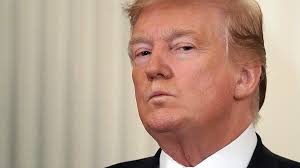
The Supreme Court on Monday declined to shield former President Trump’s tax returns from a New York grand jury subpoena, a step that could place Trump and his businesses closer to legal jeopardy.
Among the handful of cases that could expose the former president to criminal liability, the probe by Manhattan District Attorney Cyrus Vance Jr. (D) into Trump’s financial dealings appears to be the furthest along.
The justices’ move Monday was a shot in the arm for Vance’s long-running effort to obtain eight years of Trump’s personal and business tax returns and other financial records from Trump’s accounting firm, Mazars USA.
The precise scope of the Manhattan district attorney’s probe is not publicly known. But the case arose from Vance’s pursuit of hush money payments to a pair of women who allege they had affairs with Trump, including adult-film star Stormy Daniels. Vance’s office has also strongly suggested that its subpoena figures into an investigation into possible financial crimes by the Trump Organization. Manhattan prosecutors have hinted that Trump could be investigated for tax and insurance fraud.
During his White House tenure, Trump was immune from being criminally indicted by the Department of Justice (DOJ). As president, he also succeeded in avoiding final rulings on a number of other legal proceedings, at times using his office to bolster his arguments in court.
As a private citizen, however, Trump could soon find himself at the center of crisscrossing criminal probes.
Prosecutors in Georgia’s Fulton County have reportedly opened a criminal investigation into Trump’s efforts last month to pressure the state’s top election official to “find” enough votes to reverse his 2020 electoral loss.
Separately, the DOJ under the Biden administration is facing mounting pressure to prosecute Trump for his role inciting the Jan. 6 insurrection at the Capitol as well as his alleged obstruction of former special counsel Robert Mueller’s Russia probe.
But it is the Manhattan district attorney’s investigation that appears to be the most developed case against Trump to date.
Vance’s office wouldn’t say explicitly when it would execute its subpoena in light of the Supreme Court development on Monday when contacted by The Hill.
But earlier this month his office hired a prominent former federal prosecutor, Mark Pomerantz, to help investigate Trump’s business dealings, which some experts took as a sign that the investigation was escalating.
“He’s clearly gearing up,” Steve Rosenthal, a senior fellow at the Urban-Brookings Tax Policy Center, said about Vance. “I think he’s got the experts and the resources to pursue ex-President Trump.”
The Supreme Court’s rebuff of Trump on Monday may be the decisive blow to the former president’s longstanding attempt to keep Vance’s subpoena ensnared in litigation, which began shortly after a New York grand jury issued the subpoena in 2019.
In July, the justices voted 7-2 to reject Trump’s argument that presidents have sweeping immunity from criminal proceedings but said Trump could pose other legal objections in the lower courts.
Trump then mounted unsuccessful litigation in New York-based federal district and appellate courts, claiming that the subpoena should be blocked because it is overly broad and was issued in bad faith and designed to harass.
The justices’ move on Monday effectively declined to halt the lower court rulings against Trump. The order was issued without comment or noted dissents.
Trump’s attorney William Consovoy did not respond when asked if the former president would submit additional filings to the Supreme Court related to the New York grand jury subpoena.
Trump, in a statement on Monday, vowed to continue to fight. He called the New York prosecutors’ investigation “a continuation of the greatest political Witch Hunt in the history of our Country.”
“The Supreme Court never should have let this ‘fishing expedition’ happen, but they did,” he said.
The New York subpoena is one of a number of efforts to obtain Trump’s tax returns. Trump is the first president in decades not to make any of his tax filings public. He had said he wouldn’t do so while he was under audit, but the IRS has said that audits don’t prevent people from releasing their own tax information.
Even if the district attorney’s office obtains Trump’s tax returns, they are unlikely to become public anytime soon because of grand jury secrecy rules.
The New York Times has reported, based on tax return data it obtained, that the former president paid little to no federal income taxes in many recent years.
In a separate investigation, House Ways and Means Committee Chairman Richard Neal (D-Mass.) in 2019 requested six years of Trump’s personal and business tax returns from the Treasury Department. Neal has said he is interested in the documents because his committee is considering legislation and conducting oversight about how the IRS enforces tax laws against a president.
The Trump administration refused to comply with the request, which was made under a section of the tax code that states that the Treasury Secretary “shall furnish” tax returns sought by the chairs of Congress’s tax committees. The dispute is currently the subject of lawsuit that has yet to be resolved.
Judge Trevor McFadden, a Trump-appointed federal district judge in Washington, D.C., earlier this year ordered the Biden administration to give Trump’s personal lawyers 72 hours’ notice if they plan to provide House Democrats with the former president’s tax returns. The order currently expires March 3.
The Biden administration has not yet said how it will handle House Democrats’ request. Treasury Secretary Janet Yellen said Monday during a virtual event hosted by The New York Times that on the presidential tax return issue she “will seek legal advice on this and follow the law.”
Neal said in a statement Monday that the Supreme Court “affirmed that no one is above the law” in the Vance case, and that he was confident that he would prevail in his own case.
Via The Hill
